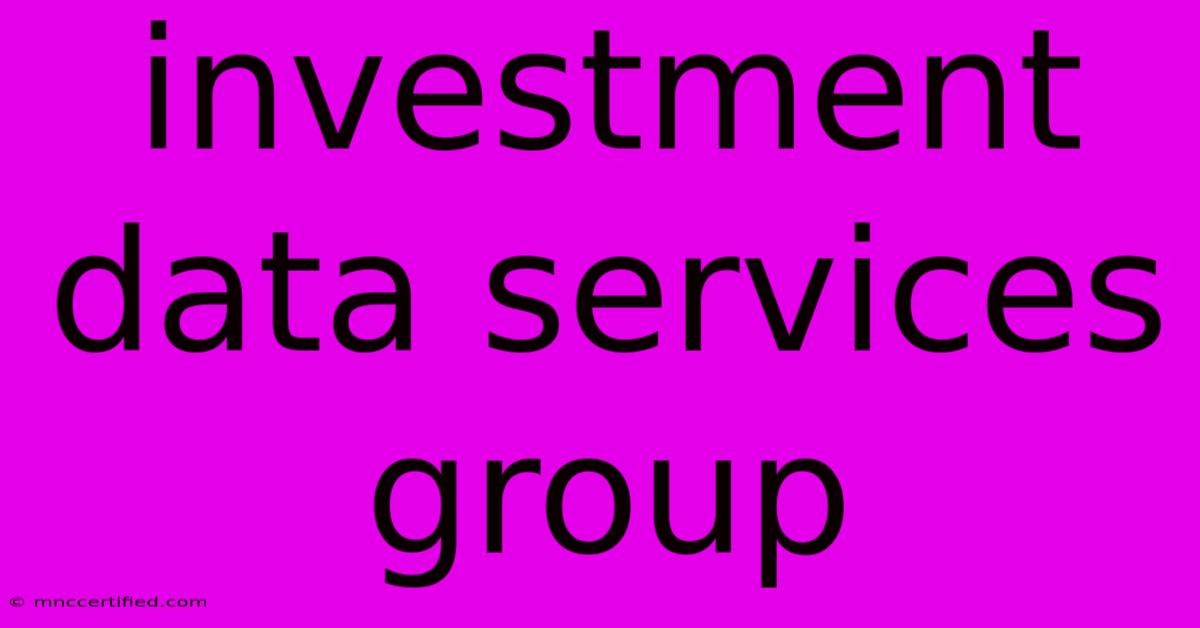Investment Data Services Group

Table of Contents
Investment Data Services Group: Your Guide to Navigating the Market
The financial world thrives on data. Understanding market trends, analyzing investment performance, and making informed decisions hinges on access to reliable, comprehensive investment data. This is where a robust Investment Data Services Group (IDSG) plays a crucial role. But what exactly is an IDSG, and how can you leverage their services to gain a competitive edge? This comprehensive guide will explore the key aspects of IDSGs, their offerings, and how to choose the right one for your needs.
What is an Investment Data Services Group?
An Investment Data Services Group is a company or a division within a larger financial firm specializing in providing high-quality, actionable investment data. These groups aggregate data from diverse sources, process it, and deliver it in various formats to meet the specific requirements of their clients. Their services are invaluable for a wide range of financial professionals, including:
- Investment Managers: Utilize data for portfolio construction, risk management, and performance attribution.
- Hedge Funds: Depend on real-time data for high-frequency trading and sophisticated strategies.
- Financial Advisors: Use data to create personalized investment plans and offer tailored advice to clients.
- Institutional Investors: Require extensive data for macroeconomic analysis and long-term strategic planning.
- Research Analysts: Rely on in-depth data analysis to generate insights and inform investment recommendations.
Essentially, an IDSG acts as a bridge between raw financial data and informed investment decisions.
Key Services Offered by Investment Data Services Groups
The services provided by IDSGs vary significantly depending on the specific group and their target audience. However, some common offerings include:
1. Market Data:
- Real-time and historical price data: Covering equities, bonds, derivatives, and other asset classes.
- Indices and benchmarks: Essential for performance comparison and asset allocation strategies.
- Economic indicators: Macroeconomic data influencing market sentiment and investment decisions.
2. Financial Analytics:
- Portfolio analytics: Tools for performance measurement, risk assessment, and optimization.
- Quantitative analysis: Advanced statistical methods for identifying investment opportunities.
- Algorithmic trading support: Data feeds and infrastructure for automated trading systems.
3. Research and Reporting:
- Fundamental data: Company financials, earnings reports, and analyst estimates.
- Alternative data: Non-traditional data sources like social media sentiment or satellite imagery.
- Custom reports and dashboards: Tailored data visualizations and analysis specific to client needs.
4. Data Integration and Technology:
- APIs and data feeds: Seamless integration with existing trading platforms and analytical tools.
- Data warehousing and management: Secure storage and retrieval of vast datasets.
- Cloud-based solutions: Accessible data and analytics through secure cloud platforms.
Choosing the Right Investment Data Services Group
Selecting the appropriate IDSG requires careful consideration of several factors:
- Data Coverage: Ensure the IDSG offers comprehensive data covering the asset classes and markets relevant to your investment strategy.
- Data Quality: Verify the accuracy, reliability, and timeliness of the data provided. Look for groups with rigorous data validation processes.
- Technology and Infrastructure: Assess the technology platform and its ease of integration with your existing systems.
- Customer Support: A responsive and knowledgeable support team is essential for resolving any technical issues or data-related questions.
- Pricing and Contracts: Compare pricing models and contract terms to find the most cost-effective solution for your needs.
The Future of Investment Data Services Groups
The field of investment data services is constantly evolving. Technological advancements, such as big data analytics, artificial intelligence (AI), and machine learning (ML), are transforming how data is collected, processed, and utilized. IDSGs that embrace these technologies will be better positioned to provide more sophisticated analytics and insights to their clients. The demand for alternative data is also growing, requiring IDSGs to expand their data sources beyond traditional financial information.
In conclusion, Investment Data Services Groups play a critical role in the modern financial landscape. By carefully considering the factors outlined above, investors and financial professionals can select an IDSG that provides the high-quality data and analytical tools necessary to make sound investment decisions and achieve their financial goals. Investing in a reliable IDSG is an investment in your success.

Thank you for visiting our website wich cover about Investment Data Services Group. We hope the information provided has been useful to you. Feel free to contact us if you have any questions or need further assistance. See you next time and dont miss to bookmark.
Featured Posts
-
Watch Sporting Cp Vs Arsenal Live
Nov 27, 2024
-
Sunderland U21s Fall To Sheffield United U21s
Nov 27, 2024
-
Egypt Boat Sinks 8 Still Missing
Nov 27, 2024
-
First Glastonbury Act Rod Stewart
Nov 27, 2024
-
Sporting Cp Vs Arsenal Watch Champions League
Nov 27, 2024